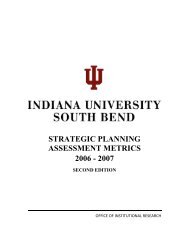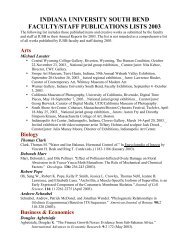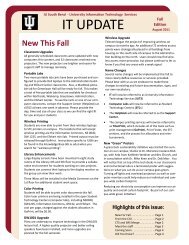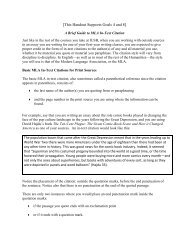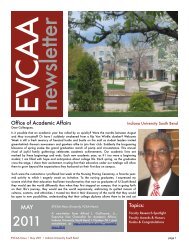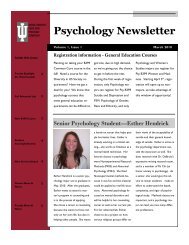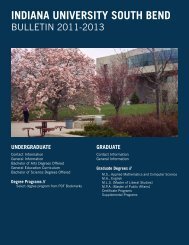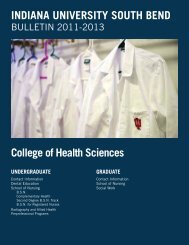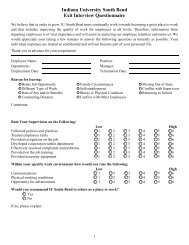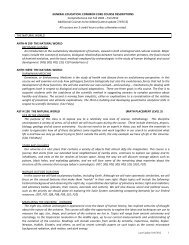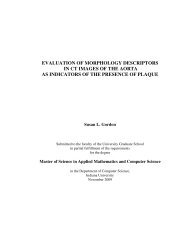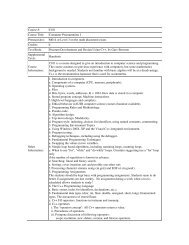Current version - Indiana University South Bend
Current version - Indiana University South Bend
Current version - Indiana University South Bend
You also want an ePaper? Increase the reach of your titles
YUMPU automatically turns print PDFs into web optimized ePapers that Google loves.
1063 SCHOOL OF EDUCATION<br />
Competent Professionals<br />
Graduates from IU <strong>South</strong> <strong>Bend</strong> education degree<br />
programs are well versed in the knowledge of the subject<br />
matter and how to teach that subject matter to diverse<br />
learners. Education candidates have extensive knowledge<br />
of learners, instructional pedagogy, diversity, and<br />
technology. IU <strong>South</strong> <strong>Bend</strong> education candidates know<br />
how to apply this knowledge in educational settings.<br />
Ethical Dispositions<br />
Graduates from IU <strong>South</strong> <strong>Bend</strong> teacher education<br />
programs are caring and ethical teachers able to support<br />
learning and development in all students. Professional<br />
dispositions, as defined by the School of Education, are<br />
based on the <strong>Indiana</strong> Professional Standards Board’s<br />
principles and the code of ethics from the National<br />
Education Association. Education candidates must<br />
demonstrate their commitment to attaining excellence<br />
in teaching and learning. Through their performance in<br />
the university classroom and in the field, all education<br />
candidates demonstrate their ability to be collaborative,<br />
caring professionals dedicated to meeting the needs of<br />
diverse learners. A specific list of dispositions is included<br />
in our conceptual framework.<br />
Reflective Practice<br />
All candidates in the School of Education are reflective<br />
practitioners and decision makers able to analyze and<br />
grow from their individual professional experience<br />
throughout their careers. Education candidates develop<br />
habits of reflection as they proceed through their teacher<br />
education programs.<br />
Commitment to Diversity<br />
Teachers prepared at IU <strong>South</strong> <strong>Bend</strong> are able to support<br />
learning for all students. Our graduates have the<br />
knowledge, disposition, and skills necessary to meet the<br />
needs of students in today’s diverse classrooms.<br />
Leadership<br />
Leadership is the newest theme in our conceptual<br />
framework. For candidates, leadership is demonstrated<br />
through attending class regularly, meeting deadlines,<br />
and being a reliable and respectful class participant. As<br />
candidates progress through the program, they begin to<br />
self-assess strengths and weaknesses in order to set goals<br />
for improvement. They take greater responsibility for<br />
student learning and incorporate instructive feedback<br />
into their field experience and class assignments. By<br />
the end of the program, they willingly collaborate with<br />
peers and professionals in the school setting with the<br />
realization that they can be models for students and<br />
other educators.<br />
Commitment to the Integration of<br />
Technology<br />
Teachers prepared at IU <strong>South</strong> <strong>Bend</strong> have the knowledge,<br />
dispositions, and skills necessary to effectively use<br />
technology to help all students learn. Education<br />
candidates are expected to incorporate technology<br />
throughout their course work and clinical experiences in<br />
order to facilitate student learning.<br />
Standards<br />
Programs in the School of Education are aligned with<br />
a variety of national and state standards. Candidates<br />
must demonstrate that they have the knowledge, skills,<br />
and dispositions associated with appropriate standards<br />
related to their major.<br />
Monitoring of Candidate Progress<br />
TOWARD Meeting Standards at Critical<br />
Checkpoints<br />
In addition to reviewing grades and cumulative grade<br />
point averages, candidate progress is monitored carefully<br />
at three critical checkpoints. At these checkpoints<br />
candidates are required to submit designated artifacts,<br />
aligned with state and national standards, in an Oncourse<br />
pseudo course. These artifacts are reviewed by faculty to<br />
determine if the candidate is meeting the standards or<br />
making progress toward meeting the standards. If the<br />
artifact provides evidence that the candidate is meeting<br />
the standards a grade of S is assigned for the pseudo<br />
course. If the artifact does not meet the standards, the<br />
candidate is contacted and a remedial plan is developed.<br />
In such cases, the candidate may receive a grade of<br />
R, or I. If after participation in the remedial plan, the<br />
candidate’s artifacts still do not provide evidence of<br />
meeting standards or making progress toward meeting<br />
standards, a grade of F is assigned for the pseudo course.<br />
Additional information about required artifacts is<br />
given to candidates in classes taken at the three critical<br />
checkpoints, in group advising sessions, and when<br />
enrolled in EDUC-F 100 Introduction to Education. The<br />
three critical checkpoints are listed below.<br />
Checkpoint One—Admission into Teacher<br />
Education Program (TEP)<br />
Candidates are administratively enrolled in a pseudo<br />
course when they are enrolled in either of the following<br />
classes:



